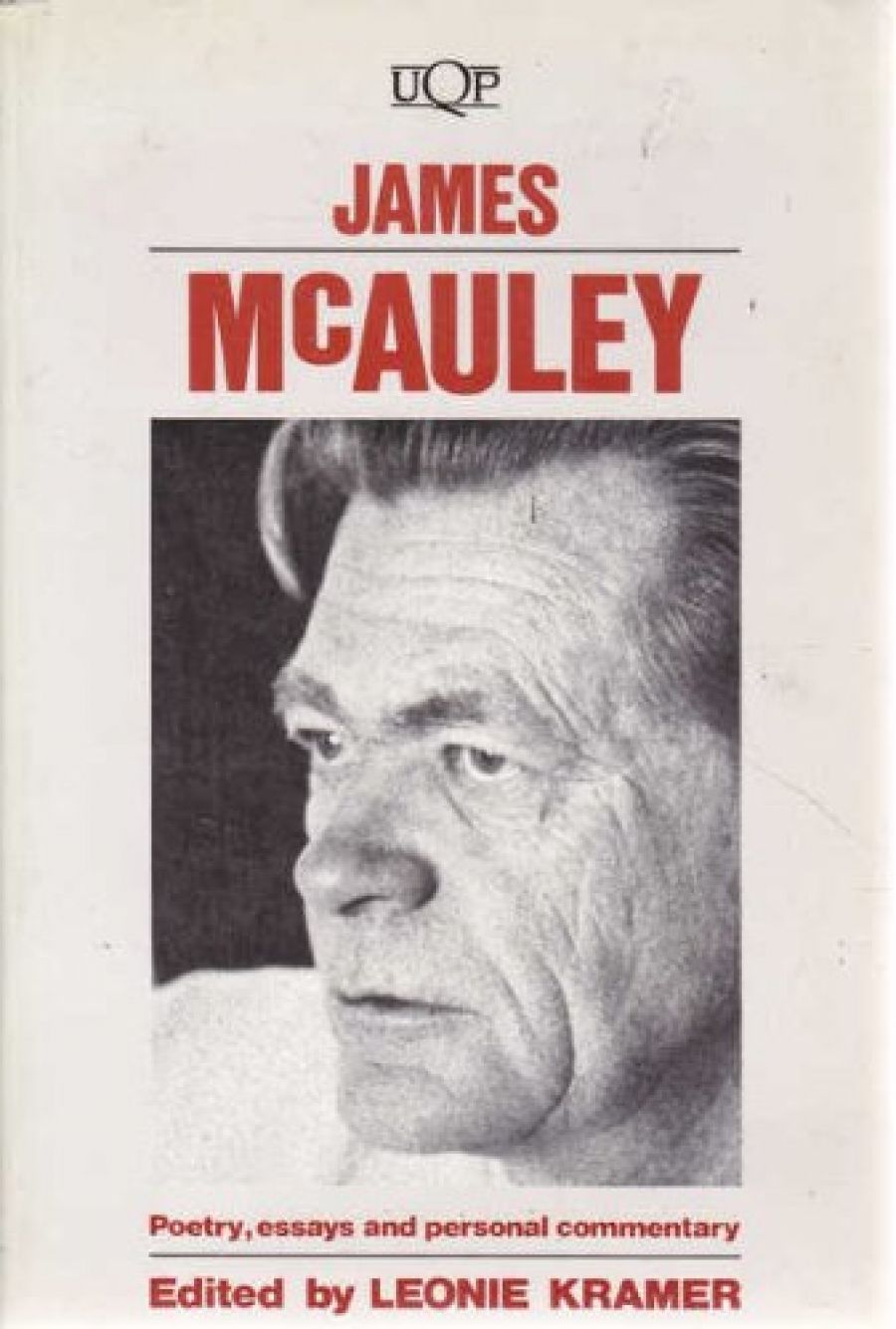
- Free Article: No
- Contents Category: Non-fiction
- Review Article: Yes
- Article Title: An editor's blind spot?
- Online Only: No
- Custom Highlight Text:
The dominant note of Professor Kramer’s long-awaited James McAuley is control. The volume will no doubt be gratefully received by lovers and adversaries of McAuley’s literary achievement, for many reasons: it brings before a wider reading audience guile a few new poems published only in the little-circulated volume Time Given (1976). These poems can now receive their due and wider admiration. (Unfortunately, only thirteen of the thirty-one poems from Time Given have been reprinted here, in two different sections.) This volume also gives wider accessibility to some of McAuley’s scattered journalism and literary criticism. Fifteen essays have been selected, but I 1hink it a great pity that some of the essays referred to and discussed at some length in Kramer’s introduction do not appear in the text, especially the seminal and highly ambivalent ‘The Magian Heresy’. In a similar way Kramer mentions the importance of the poem ‘A Letter to John Dryden, but summarily dismisses it as ‘the rather strident satire’, and does not include it in the volume.
- Book 1 Title: James McAuley
- Book 1 Subtitle: Poetry, essays and personal commentary
- Book 1 Biblio: University of Queensland Press, $16.95 pb, 255 pp
These gaps are eloquent of the kinds of control which brought Kramer’s James McAuley together. It is a neatly-compiled work, arranged in eight sections. Each section is internally chronological, but no chronology is adhered to in the whole work. This is not a bad thing necessarily, although the premises behind such an arrangement need further thought. The volume is arranged so that ‘the relationship between McAuley’s poetic preoccupations and his critical and intellectual position’ will be understood.
So it is this man McAuley – ‘McAuley, faithful to the view enunciated in his early career, that a poem is a product of the whole man, and not one of his faculties … ’ – who should emerge from Kramer’s volume. To this end, the still-propounded New Critical approach of the Introduction and Editor’s notes places a grid over the already strict selection of poems and essays. The central lines of this grid shape an authorial presence of control and lucid simplicity. McAuley is not a simpleton or an empty dogmatist, a mere happy believer, but a believer who also knows despair. But he does know, even in his unknowing. Kramer’s McAuley is in control ultimately: he manifests complexities, makes his images refer to a larger design, discovers, recognises, ‘expresses through … flexible receptivity’. McAuley the person is given priority of comment in the footnotes too, to place his mantle over the poetry, giving it a proper context beyond the grasp of ‘some prying Ph.D student’.
But what do the gaps have to say? If one can hear them beneath the neat arrangement, there are many voices of McAuley, and they do not easily find a unified centre. I would argue that they do not find a unity at all. In many of McAuley’s late poems it is the language which refuses to accept New Critical formulations of paradox. What is astounding and great about so many of the late poems is that they trace the struggle for ownership of the text. It is a struggle for supremacy of an authorial will through balanced ambiguity, delight in paradox, in a language which continually refuses or fails to hold a balanced view. Reading the Trakl poems for example, or ‘Parish Church’, or ‘Music Late at Night’, the images do proceed through dialectical tensions, but there is also traceable in these, and I would suggest in so many of McAuley’s poems, a process of subversion of controls, a desire to reach out of the neatly-balanced ambiguities.
‘Music Late at Night’ struggles most actively with this subversiveness. In the middle of lyrical statement and morally controlled lament the speaker three times calls ‘hold and wait. / Wait. The lighted empty street / Waits for the start …’ There is a desire here to create a ‘soundless music’, to possess a power over music now that ‘the rigid silence is complete’. But at the same time the poem enunciates the defeat of any authorial will, the fact that words noisily fabricate this silence which does not hold, cannot wait. And then the will to orchestrate, to rise above language, turns necessarily back into the moral platitudes of the final stanza, where Spring beauties are ‘Puzzling poor flesh to live and care’.
‘Music Late at Night’, together with many of the late poems, are worth reading for their lack of convincing resolution, for their failed desire to reach beyond words, to achieve a balanced world of ‘sense and use’. They are magnificent failures to get beyond easy paradox. They enter a field of more disturbing ambiguity where a McAuley of control and power over language is pitted against something less unifiable, a more fragmenting operation of language which would disrupt the seeming self-sufficiency of the rhymed verse, the balanced dialectic, the moral tensions.
Such poems, read in this way, offer an internal critique of Kramer’s kind of McAuley. Contemporary readers of McAuley’s texts will find a rich field of discourse which does not always have control of its effects. Such effects may still operate through lyrical beauty and orderly form, but they are ultimately made to surrender to the refusal of language to control meaning.


Comments powered by CComment